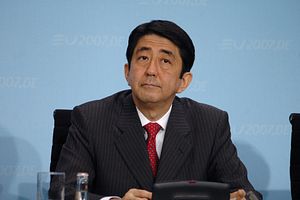As Sheila Smith of the Council of Foreign Relations noted this week, the LDP victory in Sunday’s election likely means another four years in office for current Prime Minister Shinzo Abe. That’s unwelcome news for Chinese officials, who have often pointed to Abe’s personal political tendencies as the cause of a worsened China-Japan relationship. With Abe guaranteed power for the next few years, Beijing will have to choose whether to modulate its response to Abe for the sake of better bilateral relations – or whether to stick firm to a hardline stance criticizing the prime minister’s rightist tendencies.
The official response from China’s Foreign Ministry was carefully crafted. Asked about the election results in Monday’s press conference, spokesperson Qin Gang explained China’s interest in Japanese domestic politics. “Any change in Japan’s policy in the military and security fields indicates where the country is heading for and bears on the security environment of the region,” Qin said. He added that China hopes Japan “can learn hard lessons from history, conform to the trend of the times featuring peaceful development and win-win cooperation, [and] respect the legitimate and reasonable security concerns of countries in the region” – a standard line from Chinese diplomats.
However, the question that preceded Qin’s answer points to deeper insecurities about Abe’s reelection. An unnamed reporter noted concerns that Abe’s electoral victory “will enable him to get rid of the pacifist constitution and get Japan fully armed.” In official discourse, China is remaining neutral, adopting a wait-and-see attitude toward Abe’s future moves. By contrast, at the semi-official level, Chinese media are not shy about airing concerns that Abe will continue to move Japan down a path toward militarization and unchecked nationalism.
On Wednesday, Xinhua’s website published a “yearender” by Jon Day warning that Abe’s “true ultranationalistic colors” have not changed. “Abe plans to continue to drag the nation down a new path of remilitarized, old nationalism,” the piece said. Beginning with Abe’s controversial visit to the Yasukuni Shrine last December, the yearender traced Abe’s “rightwing ‘power play’” throughout the past year, including an investigation into the 1993 Kono Statement apologizing for Japan’s use of “comfort women” during World War II.
For China, historical revisionism is inextricably bound up with Abe’s push to reinterpret – and perhaps eventually revise – Japan’s constitution to allow more latitude for Japan’s Self Defense Forces (SDF). For both historical and geopolitical reasons, China is averse to Abe’s plan to increase Japanese military strength. Now, with a sweeping LDP victory at the polls on Sunday, “the remilitarization of [Japan] could be further reaching and on a larger scale than previously thought,” Xinhua predicted. A separate Xinhua article quoted Abe as pledging to “emphasize the need to amend the constitution and make efforts to see growing public debate on the issue.” Xinhua also drew attention to some of Abe’s other controversial security plans, including the just-enacted state secrets law and the relocation of the U.S. airbase in Okinawa.
In laying out its concerns about Abe, though, Xinhua also tried to emphasize a disconnect between Abe’s security policies and the Japanese people. Despite a landslide LDP victory on Sunday, as predicted, Xinhua cited low voter turnout and confusion over a “pointless” snap election as proof that many Japanese are more wary of Abe than the poll results seems to indicate. “Abe’s election, win no reflection of public will,” one online Xinhua headline proclaimed. By drawing a distinction between Abe himself and Japan as a whole, Chinese media may be hoping to carve out space to criticize Abe’s “militarism” without jeopardizing the fragile progress in the overall bilateral relationship.
At the recent APEC summit, China demonstrated a cautious willingness to work with the current Japanese administration. Both willingness and caution were readily apparent durin the brief meeting between Abe and Chinese President Xi Jinping. Moving forward, though, the Chinese government will have a hard time walking back its dislike of Abe, especially its tendency to read each of his policies as part of an over-arching plan to return Japan to World War II-era militarism. With Abe in power for four more years, that level of distrust will have an serious impact on the China-Japan bilateral relationship.

































